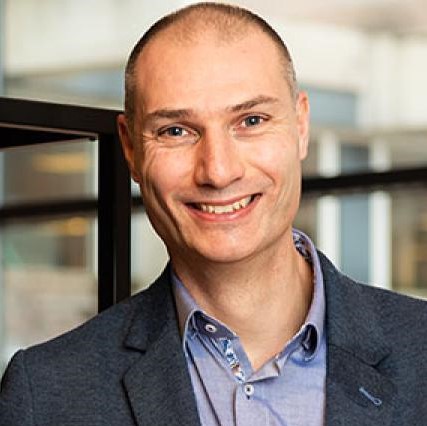
Bekijk deze pagina in het Nederlands
Professor of Palliative Care Jeroen Hasselaar
‘Proper palliative care goes beyond just medical care’
March 6, 2023
How should we deal with care for the rapidly-growing group of people in their final stage of life? According to Jeroen Hasselaar, Professor of Social Empowerment in Palliative Care, it is high time to have a public debate about that. ‘This issue not only affects the care sector, but society as a whole.’

‘How do we arrange care in such a way that people receive sufficient support in that final stage of life, which can last anywhere from months to years?‘
Jeroen Hasselaar, associate professor of Social Empowerment in Palliative Care at Radboudumc / Radboud University
Since the outbreak of COVID-19, ‘pandemic preparedness’ – ensuring that we are ready to cope with the next pandemic – is a familiar concept. We should also be talking about ‘palliative preparedness’, according to Professor Hasselaar. Hasselaar is one of the speakers at the pre-conference Connecting Communities in the Netherlands about the future of palliative care in the Netherlands, which is being organised by Agora and PZNL. Hasselaar: ‘In the coming decades, we will be faced with an enormous group of people who require palliative care.’
That is due to the ageing population and the increase in life-threatening or chronic illnesses, which people are living with longer than before. They are also being treated at home more and more often and for longer periods of time. ‘How do we arrange care in such a way that people receive sufficient support in that final stage of life, which can last anywhere from months to years? We are only starting to answer that question, even though the urgency is becoming ever greater’, says Hasselaar.
Preconference
During the preconference ‘Connecting Communities in the Netherlands’ on Wednesday 14 June, Jeroen Hasselaar will provide a lecture under the title ‘Palliative Preparedness: Societal challenges in a new era’.
What do people in the palliative stage need in particular?
‘We are exploring that through research. People often think, above all, of physical care, but dying and suffering are not strictly medical issues. There’s a lot more at play. Anyone who has a life-threatening illness is still just a human being, as well as being a patient. That is forgotten sometimes. It’s also about people still being able to give direction to their lives, in spite of their illness.’
So, what’s going on specifically?
‘Worries about the children: will they turn out well later? To what extent can you still be yourself, even though you’re no longer able to do lots of things? What can you still manage to do? What is important in life? How can you remain connected to family and friends? How do you deal with deterioration and loss, and what can help to keep your spirits up? However, it can also be about practical questions, such as where you can get certain aids so you can spend the final stage at home and who can help with that.
Can people articulate those needs properly?
‘They often find that difficult. Doctors and nurses also don’t really know how they should discuss this. In our research, we have developed tools for that, such as a digital tool, in which people set off with various avatars – ‘virtual people’ – and can discover what they consider to be important values; or a card game that helps to make their needs and wishes concrete. For example: ‘I would like to drink a beer with my friends from back in the day’.
Does that help?
‘Our research shows that these tools increase the chance of a good conversation about important values and needs, not only because patients know what they want better themselves, but also because they offer care providers more starting points for such a conversation.’
‘The social aspects of palliative care still get short shrift.‘
Suppose that someone knows what they want. Will they receive the right help with that?
‘That is by no means always the case. The medical part is often well-arranged, but the social aspects of palliative care still get short shrift. Not because that social dimension is not seen by doctors and nurses. However, they often have too little time to really do something with that. Social workers might be able to take on some of the support, but their involvement with palliative care is still limited: they often don’t have such a clear picture of it.’
And for the rest?
‘The care sector and the social domain are still two separate worlds. The funding goes through different laws and channels, as a result of which it’s not easy to work together and transfer some of the care. In practice, this means that many questions are left unanswered and that informal caregivers have a lot on their plate; often too much, as a result of which they become overburdened. If there are no informal caregivers in the neighbourhood, people are sometimes left to cope completely alone.’
How can we solve this problem?
‘We still don’t have a clear answer to that. One of the problem-solving approaches is for the care domain and the social domain to start collaborating more in order to support incurably ill people and their loved ones at home. A condition for that is that care providers and social workers become better acquainted with each other’s expertise, working method and possibilities.’
What helps with that?
‘Agora is working with Movisie in a number of municipalities on living labs, where, for example, the municipality is getting general practitioners (GPs), district nurses and social workers around the table. On the basis of concrete cases, they are discussing how they can help people with an incurable illness more effectively. Those types of pilots are extremely important to gain experience with collaboration in palliative care.’
Is that enough?
‘No, lots of plans and good intentions come unstuck because the funding ultimately doesn’t come through. That is why I am following a recent initiative of the national government, regarding cross-domain collaboration, with great interest. That means that municipalities are given the opportunity to arrange care for vulnerable people differently: across different domains, without having to deal with all kinds of barriers in the funding and different pieces of legislation. I am curious about the pilots that have been announced.’
Why do you find removing barriers so important?
‘Removing barriers can be a major boost for better collaboration between care and welfare organisations, in the case of supporting people in palliative care. At the same time, it is clear that we cannot solve everything with professional care. That care is already under great stress due to staff shortages. And that problem is only expected to grow. That is why we need informal care: from volunteers, neighbours and family.
What can be expected from that? The familiar social ties, such as churches, have largely been lost. Families live further away from each other and neighbours don’t even know each other sometimes.
‘That doesn’t help. It means that we need to look for new networks and connections. The good new is that those are already arising, albeit very gradually. For example, take ‘compassionate communities’. Those are communities that consciously want to make space for the consequences of being incurably ill and growing frailty. They set up all kinds of facilities to support vulnerable and severely ill people, such as drop-in centres, community healthcare projects and palliative care networks for home support.
‘It is encouraging that greater focus is being placed on communities seeking to support one another through illness, loss and grief.’
What do I find those communities?
‘In the Netherlands, this development is still in its infancy, but in Flanders and Great Britain it is getting off the ground more and more. On the initiative of Agora, a Learning Network Compassionate Communities has been set up in order to learn from good examples in the Netherlands and abroad. It is encouraging that greater focus is being placed on communities seeking to support one another through illness, loss and grief.’
How does that informal care relate to professional care?
‘Projects of volunteers cannot replace professional care; they are more of a complement to that. However, a very valuable complement, which you shouldn’t underestimate. More is needed still to connect those two with each other. That also requires rethinking the concept of integrated care.
‘Good palliative care is something that concerns the whole of society’, is the argument of the British professor Allan Kellehear, the founder of compassionate communities. Do you agree with that?
‘I fully endorse that. Palliative care is not just about individuals. How you arrange that care properly is also more than just a technical question. It also touches on ethical questions. What kind of values do we, as a society, find important? Do we want to take good care of each other? What do we mean by a dignified life in the final stage of life and how do we shape that? What are we prepared to give for that? We cannot avoid asking ourselves these questions.’
- Jeroen Hasselaar benoemd tot bijzonder hoogleraar Social Empowerment in de Palliatieve Zorg (Jeroen Hasselaar appointed professor by special appointment of Social Empowerment in Palliative Care (Dutch only))
- See here for more information about the pre-conference and to register.
- Lees meer over onze proeftuinen (Read more about the living labs (Dutch only))
- Lees meer over het Lerend Netwerk Compassionate Communities (Read more about the Learning Network Compassionate Communities (Dutch only))
- Lees meer over zingeving en geestelijke verzorging thuis in de praktijk (Talking about questions of life and death (Dutch only))
Share:
